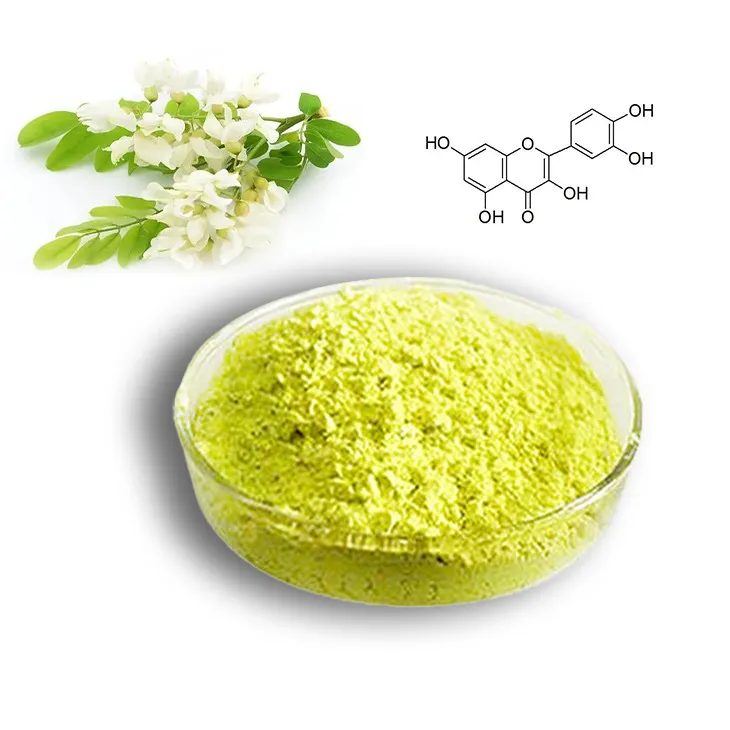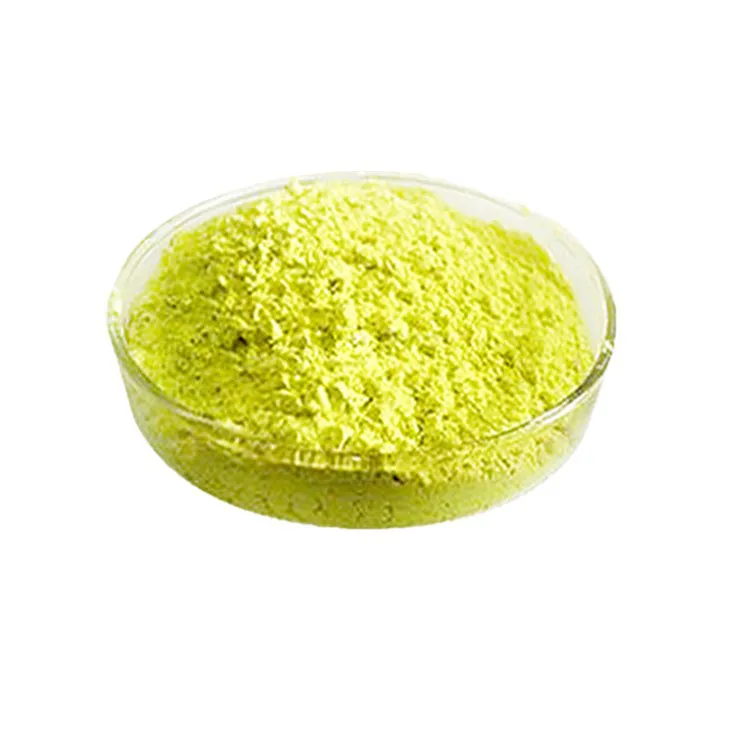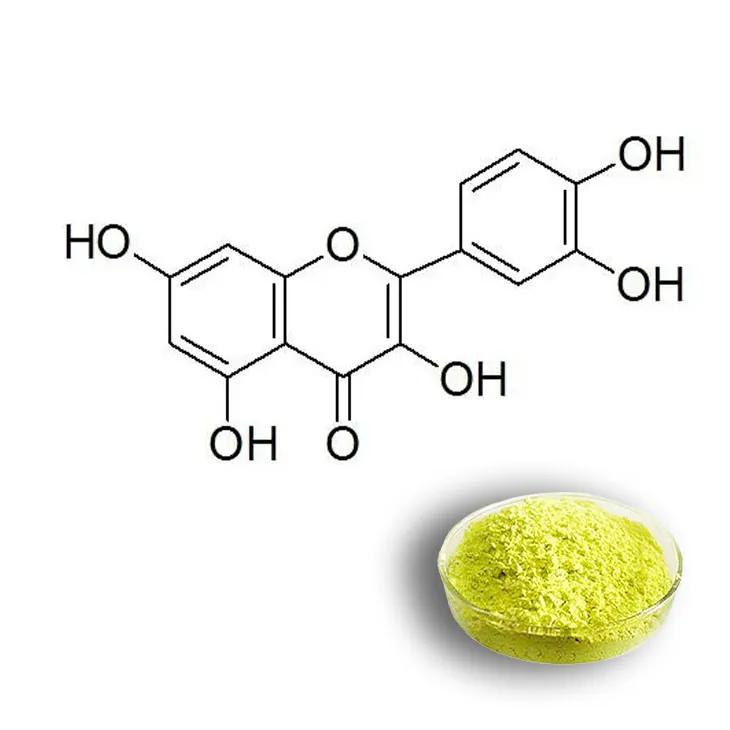- 0086-571-85302990
- sales@greenskybio.com
Ten Application Efficacies of Organic Quercetin on Skin.
2024-12-18

1. Introduction
In the realm of skin care, the search for natural and effective ingredients is an ongoing pursuit. Organic Quercetin has emerged as a remarkable substance with a plethora of benefits for the skin. Quercetin, a flavonoid found in many plants, has been the subject of extensive research, revealing its significant potential in enhancing skin health. This article delves into the ten application efficacies of organic Quercetin on skin, highlighting why it is becoming a staple in the world of natural skin care.

2. Antioxidant Protection
2.1. Free Radical Scavenging One of the primary benefits of organic quercetin for the skin is its antioxidant properties. The skin is constantly exposed to environmental stressors such as ultraviolet (UV) radiation, pollution, and cigarette smoke. These factors generate free radicals, which are highly reactive molecules that can damage skin cells. Organic quercetin acts as a powerful free - radical scavenger, neutralizing these harmful substances before they can cause oxidative stress. By doing so, it helps to prevent premature skin aging, including the formation of wrinkles, fine lines, and age spots.
2.2. Protecting Against UV - Induced Damage UV radiation from the sun is a major contributor to skin damage. Organic quercetin has been shown to offer protection against UV - induced damage. It can absorb UV light and prevent it from penetrating deep into the skin layers. Additionally, it helps to repair the damage already caused by UV exposure. This dual - action makes it an excellent natural ingredient for sun protection and post - sun skin repair.

3. Anti - Inflammatory Effects
3.1. Soothing Skin Disorders Skin disorders such as eczema, psoriasis, and acne are often associated with inflammation. Organic quercetin has anti - inflammatory properties that can help soothe these conditions. It reduces redness, swelling, and itching, providing relief to those suffering from skin inflammations. By modulating the body's inflammatory response, quercetin helps to restore the skin's normal state.
3.2. Calming Irritated Skin For skin that is irritated due to various reasons, such as the use of harsh cosmetics or exposure to allergens, organic quercetin can act as a calming agent. It helps to reduce the irritation and restore the skin's barrier function. This is crucial for maintaining healthy skin as a damaged skin barrier can lead to further problems such as moisture loss and increased susceptibility to infections.

4. Skin Brightening
4.1. Reducing Hyperpigmentation Hyperpigmentation, which includes conditions like melasma and post - inflammatory pigmentation, can be a cosmetic concern for many. Organic quercetin can help to reduce hyperpigmentation by inhibiting the activity of tyrosinase, an enzyme involved in the production of melanin. By reducing melanin production, it helps to lighten dark spots and even out the skin tone, resulting in a more radiant complexion.
4.2. Promoting a Glowing Complexion In addition to reducing hyperpigmentation, organic quercetin also promotes a general glow to the skin. It improves blood circulation in the skin, which brings more oxygen and nutrients to the skin cells. This, in turn, gives the skin a healthy, vibrant appearance.

5. Anti - Aging Effects
5.1. Boosting Collagen Production Collagen is a key protein in the skin that provides structure and elasticity. As we age, collagen production decreases, leading to sagging skin and wrinkles. Organic quercetin can stimulate collagen production, helping to maintain the skin's firmness and elasticity. By promoting collagen synthesis, it helps to reverse the signs of aging and keep the skin looking youthful.
5.2. Improving Skin Elasticity In addition to collagen production, organic quercetin also improves skin elasticity. It does this by enhancing the function of fibroblasts, the cells responsible for producing the extracellular matrix in the skin. A more elastic skin is less likely to develop wrinkles and is more resistant to stretching and sagging.
6. Moisture Retention
6.1. Strengthening the Skin Barrier The skin barrier plays a crucial role in retaining moisture. Organic quercetin can strengthen the skin barrier by promoting the production of ceramides, lipids that are essential for the integrity of the skin barrier. A stronger skin barrier helps to prevent moisture loss, keeping the skin hydrated and supple.
6.2. Hydrating the Skin By preventing moisture loss, organic quercetin also has a hydrating effect on the skin. It helps to lock in the skin's natural moisture, giving it a plump and healthy appearance. This is especially beneficial for those with dry or dehydrated skin.
7. Wound Healing
7.1. Promoting Cell Regeneration Organic quercetin can promote cell regeneration, which is essential for wound healing. It stimulates the growth and division of skin cells, helping to close wounds more quickly. This property makes it useful for treating minor cuts, abrasions, and other skin injuries.
7.2. Reducing Scarring In addition to promoting cell regeneration, organic quercetin can also reduce scarring. It helps to regulate the production of collagen during the wound - healing process, ensuring that the collagen is laid down in an organized manner. This results in a smoother and less visible scar.
8. Anti - Microbial Properties
8.1. Fighting Bacterial Infections The skin is home to a variety of bacteria, some of which can cause infections. Organic quercetin has antimicrobial properties that can help fight against bacterial infections on the skin. It inhibits the growth and spread of bacteria, reducing the risk of skin infections such as folliculitis and impetigo.
8.2. Preventing Fungal Infections Fungal infections of the skin, such as athlete's foot and ringworm, can also be a problem. Organic quercetin has been shown to have antifungal activity, preventing the growth and spread of fungi on the skin. This makes it a useful ingredient in products designed to prevent and treat fungal skin infections.
9. Anti - Allergic Effects
9.1. Reducing Skin Allergic Reactions For those with sensitive skin or skin allergies, organic quercetin can be a valuable ingredient. It has anti - allergic effects that can reduce skin allergic reactions. It inhibits the release of histamine, a chemical that is involved in allergic responses, thereby reducing symptoms such as itching, redness, and swelling.
9.2. Protecting Against Allergens Organic quercetin can also protect the skin against allergens. It forms a protective barrier on the skin, preventing allergens from penetrating and triggering an allergic reaction. This is especially important for those who are exposed to environmental allergens on a regular basis.
10. Conclusion
In conclusion, organic quercetin offers a wide range of benefits for the skin. From antioxidant protection and anti - inflammatory effects to skin brightening, anti - aging, and wound healing, it has proven to be a versatile and effective ingredient in skin care. As more research is conducted on this natural flavonoid, its potential applications in skin care are likely to expand even further. For those interested in natural skin care, incorporating products containing organic quercetin into their routine may be a wise choice.
FAQ:
What are the antioxidant mechanisms of organic quercetin on skin?
Organic quercetin has antioxidant mechanisms on the skin mainly through its ability to scavenge free radicals. Free radicals are produced by various factors such as UV radiation, pollution, and normal metabolic processes in the body. Quercetin can donate electrons to these free radicals, thereby neutralizing them and preventing them from causing oxidative damage to skin cells. This helps in reducing the signs of skin aging, such as wrinkles, fine lines, and dullness, as oxidative stress is one of the major contributors to the aging process of the skin.
How does organic quercetin reduce inflammation in skin disorders?
Organic quercetin reduces inflammation in skin disorders by modulating the body's inflammatory response pathways. It can inhibit the production of pro - inflammatory cytokines and enzymes. For example, it may suppress the activation of NF - κB, a key regulator of inflammation. By doing so, quercetin helps to reduce redness, swelling, and pain associated with skin disorders like eczema, psoriasis, and acne, promoting the healing process of the skin.
Can organic quercetin improve skin elasticity?
Yes, it can. Organic quercetin helps improve skin elasticity. It promotes the synthesis of collagen and elastin in the skin. Collagen provides structural support to the skin, while elastin gives the skin its elasticity. By protecting skin cells from oxidative damage and inflammation, quercetin creates a favorable environment for the production of these important skin components, thereby enhancing skin elasticity and firmness.
Is organic quercetin suitable for all skin types?
Generally, organic quercetin is suitable for most skin types. However, individuals with extremely sensitive skin may need to do a patch test first. Since quercetin is a natural compound, it is less likely to cause severe adverse reactions compared to some synthetic chemicals. For normal, dry, oily, or combination skin types, it can provide antioxidant, anti - inflammatory, and skin - enhancing benefits without significant side effects.
How should organic quercetin be applied to the skin?
Organic quercetin can be applied to the skin in various forms. It is often found in skincare products such as creams, serums, and lotions. These products are typically formulated to ensure proper penetration and effectiveness on the skin. Some products may also combine quercetin with other beneficial ingredients for enhanced skin benefits. It is important to follow the instructions on the product label for the best application method.
Related literature
- The Role of Quercetin in Skin Health: A Comprehensive Review"
- "Quercetin: An Antioxidant for Skin Anti - aging"
- "Organic Quercetin and Its Impact on Skin Inflammatory Disorders"
- ▶ Hesperidin
- ▶ citrus bioflavonoids
- ▶ plant extract
- ▶ lycopene
- ▶ Diosmin
- ▶ Grape seed extract
- ▶ Sea buckthorn Juice Powder
- ▶ Beetroot powder
- ▶ Hops Extract
- ▶ Artichoke Extract
- ▶ Reishi mushroom extract
- ▶ Astaxanthin
- ▶ Green Tea Extract
- ▶ Curcumin Extract
- ▶ Horse Chestnut Extract
- ▶ Other Problems
- ▶ Boswellia Serrata Extract
- ▶ Resveratrol Extract
- ▶ Marigold Extract
- ▶ Grape Leaf Extract
- ▶ blog3
- ▶ blog4
- ▶ blog5
-
Certified Organic Almond Extract Powder Set.
2024-12-18
-
Fig Extract
2024-12-18
-
Honeysuckle Pollen
2024-12-18
-
Ivy Extract
2024-12-18
-
Hops Extract
2024-12-18
-
Beetroot juice Powder
2024-12-18
-
Natural grape seed extract
2024-12-18
-
Pomegranate Extract
2024-12-18
-
Carrageenan Extract Powder
2024-12-18
-
Sugarcane Extract
2024-12-18
-
Bitter Melon Extract
2024-12-18





















